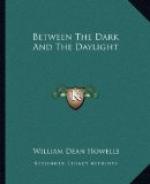When the landlord could prevail with his fellow-townsmen and townswomen to disperse in her interest, and had imposed silence upon his customers indoors, Lanfear began his vigil beside his patient in as great quiet as he could anywhere have had. Once during the evening the public physician of the district looked in, but he agreed with Lanfear that nothing was to be done which he was not doing in his greater experience of the case. From time to time Gerald had suggested sending for some San Remo physician in consultation. Lanfear had always approved, and then Gerald had not persisted. He was strongly excited, and anxious not so much for his daughter’s recovery from her swoon, which he did not doubt, as for the effect upon her when she should have come to herself.
It was this which he wished to discuss, sitting fallen back into his chair, or walking up and down the room, with his head bound with a bloody handkerchief, and looking, with a sort of alien picturesqueness, like a kindly brigand.
Lanfear did not leave his place beside the bed where the girl lay, white and still as if dead. An inexpressible compassion for the poor man filled his heart. Whatever the event should be, it would be tragical for him. “Go to sleep, Mr. Gerald,” he said. “Your waking can do no good. I will keep watch, and if need be, I’ll call you. Try to make yourself easy on that couch.”
“I shall not sleep,” the old man answered. “How could I?” Nevertheless, he adjusted himself to the hard pillows of the lounge where he had been sitting and drowsed among them. He woke just before dawn with a start. “I thought she had come to, and knew everything! What a nightmare! Did I groan? Is there any change?”
Lanfear, sitting by the bed, in the light of the wasting candle, which threw a grotesque shadow of him on the wall, shook his head. After a moment he asked: “How long did you tell me her swoon had lasted after the accident to her mother?”
“I don’t think she recovered consciousness for two days, and then she remembered nothing. What do you think are the chances of her remembering now?”
“I don’t know. But there’s a kind of psychopathic logic—If she lost her memory through one great shock, she might find it through another.”
“Yes, yes!” the father said, rising and walking to and fro, in his anguish. “That was what I thought—what I was afraid of. If I could die myself, and save her from living through it—I don’t know what I’m saying! But if—but if—if she could somehow be kept from it a little longer! But she can’t, she can’t! She must know it now when she wakes.”
Lanfear had put up his hand, and taken the girl’s slim wrist quietly between his thumb and finger, holding it so while her father talked on.
“I suppose it’s been a sort of weakness—a sort of wickedness—in me to wish to keep it from her; but I have wished that, doctor; you must have seen it, and I can’t deny it. We ought to bear what is sent us in this world, and if we escape we must pay for our escape. It has cost her half her being, I know it; but it hasn’t cost her her reason, and I’m afraid for that, if she comes into her memory now. Still, you must do—But no one can do anything either to hinder or to help!”




